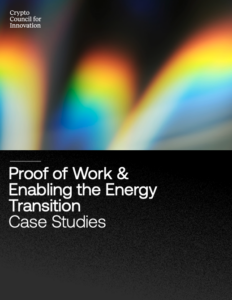REPORT
Proof of Work & Enabling the Energy Transition – Case Studies
Related report : Compendium : Impact Asessment Framework
To date, the answer to mismatches in energy supply and demand has been curtailment, which is costly and results in wasted energy. Additionally, new projects are being stalled or withdrawn due to interconnection challenges – some 90% of requests in the US are for zero-carbon energy sources; energy producers are being forced to sell at low or negative costs; and unmitigated gas flaring emits more than 400 million tons of CO2 equivalent emissions annually.The need for action on the energy transition is urgent – and Bitcoin mining can be an important bridge to much-needed investments and market support. These mining operations, in essence, data centers that power the Bitcoin network, are uniquely suited to address some of these challenges due to their unique combination of flexibility, consistency, and transparency:
- Flexibility: Numerous studies have found that a flexible load on renewable-powered grids can be a key solution minimizing the mismatch of supply and demand. Bitcoin mining operations are flexible on two critical axes: (1) location and (2) demand. This means that they can access stranded sources of energy and power up and down, depending on grid conditions.
- Consistency: Similarly, sustained demand at-scale is important. Typical demand for energy varies based on several factors such as time of day, population, etc. Consequently, markets for renewable energy sources can face periods of low demand, which affects their market prices and business models. Mining can serve as a consistent source of demand, reducing the need for costly curtailment.
- Transparency: Bitcoin, and crypto more broadly, provide a new model for engagement with energy more broadly. The transparency of the industry means that data that can be used to inform decision-making – and, it can provide a model for greater accountability.
This paper aims to surface examples of sustainability-focused operations and provide new insights into and data behind their approaches. The case studies featured in this report represent nearly two dozen sites across the US, taking various approaches to sustainable operations.
This includes:
- Utilizing flared gas as a power source to mitigate the effects of methane emissions – which has more than 80x the warming power of CO2 over a 20-year timeframe.
- Experimenting with new technology for cooling, which makes up an estimated 40% of energy consumed by mining operations.
- Balancing grid instability by powering mining operations up or down within a 5-15 second timeframe.
- Building brand-new renewable energy sources, which represent more than 3 GW of added renewable energy to the grid in the long-run.
While this paper does not focus on crypto, Bitcoin, or blockchain themselves, it is worth highlighting why this conversation matters beyond the energy transition. Crypto and blockchain technology are opening new possibilities for the digital economy. Creating options for individuals to interact and transact in a disintermediated manner has enormous implications for digital money, data ownership, identity, and beyond. Proof of Work, the consensus mechanism that underpins the Bitcoin blockchain was the starting point for these conversations. Its system of economic rewards design uniquely makes “cheating” expensive and incentivizes honest behavior.
We hope that these findings will illustrate potential pragmatic paths forward, given that this issue is critical to so many sectors. The paper also outlines the consequences of inaction for the US innovation and climate agendas. The data used in this report is timestamped 1 June 2023.
Author

CCI ADMIN























